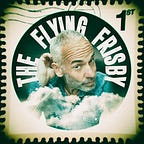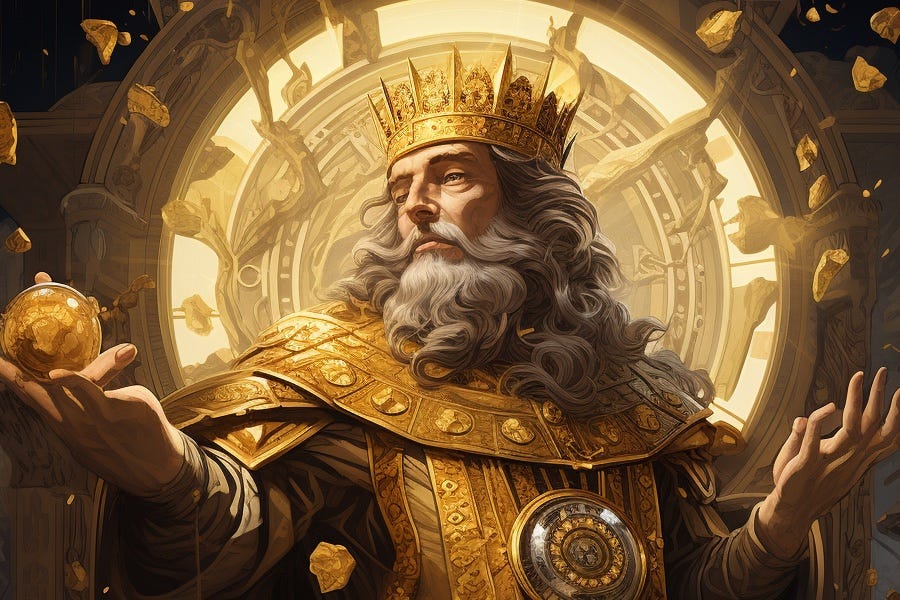The story of Midas, and how everything he touched turned to gold, is perhaps the most famous golden myth of all. His touch led to one of the most successful, long-lasting and under-rated technologies in history: coinage.
Midas was King of Phrygia (now part of Turkey) and Dionysus - more commonly known as Bacchus - the god of wine, parties and pleasure - was passing through with his entourage, revelling as they went.
Waking up one morning after a heavy night, Dionysus discovered that his tutor, Silenus, was missing. Silenus was a satyr, half man half goat. He had been drinking and he’d wandered off and fallen asleep in a rose garden, a garden that belonged to King Midas. Midas enjoyed spending time there with his daughter, who he loved more than anyone else in the world.
Midas found Silenus lying on the ground and took him in, no doubt nursing a hangover. Silenus stayed with Midas for over a week, delighting him with songs and stories, enjoying his wine, food and hospitality. On the eleventh day, Midas took Silenus back to Dionysus, who was so delighted to see his old mentor safe and well, he offered Midas whatever reward he wished for. Midas thought hard and then asked that everything he touched should turn to gold. Dionysus urged the king to reconsider, but Midas was sure and so Dionysus granted his wish.
Initially, Midas was delighted. He turned a twig, then a stone to gold. When he got home, he touched every rose in his garden, and they all turned to gold. Delighted, he ordered his servants to make him a feast, but, when his food and drink turned to gold, it dawned on him that perhaps his gift was a bane.
His daughter came to him, crying that their roses had lost their smell. Midas hugged her and she too turned to gold. What had been his beloved daughter was now a statue, albeit a golden one. Despairing, he prayed to Dionysus to deliver him from his curse. “Go and wash your hands in the River Pactolus,” Dionysus told him.
Midas did so. Dionysus’s cure worked. Midas’ power flowed into the water and the sands of the river turned to gold. Whatever he put in the water, his daughter included, was turned back into what it had been before Midas touched it.
So does that part of Midas’ story end.
The obvious moral to the tale is of the tendency of lust for wealth to overpower good sense, to make us lose sight of what we love.
But there is another tale that Midas left there in the sands of the River Pactolus.
The Western World’s First Coins
At its height, the Lydian empire stretched across all western Asia Minor, and the Pactolus flowed right through the middle. The Lydians were, around 700BC, says the Greek historian Herodotus, “the first of all those we know to introduce the use of gold and silver coins and the first to deal in retail trade."
The Chinese might have something to say about that. Their bronze spade money and knife money dates back to the 16th century BC and the late Shang Dynasty. The money gets its name from its shape, which resembles a spade or hoe, with a pointed end, a flat or round base, and a central hole for stringing them together. But it wasn’t round, so technically I suppose it isn’t coinage as we know it.
Given that we still use coins today, coinage has proved a remarkably successful technology. Indeed the Chinese ‘yuan’ and Japanese ‘yen’ both mean ‘round shape’ – referring, of course, to the shapes of coins.
“History became legend, legend became myth,” wrote Peter Jackson in his screenplay for The Fellowship Of The Ring and here is a case in point. Midas did actually exist. Most Greek mythological figures did before they became legend. Something similar happens now. The sports stars of today will become the gods, heroes and legends of tomorrow, just as those of our childhood now enjoy such status. One of Midas’ descendents was the Lydian King Alyattes I, the first western king to mint coins. He minted his coins from the alluvial electrum (a gold-silver alloy) found in the beds of the Pactolus, the gold left there by Midas. These coins, the western world’s first coins, formed the base of the Lydian empire.
Alyattes’ innovative son, Croesus, had the electrum coins of his father melted down to separate the gold from the silver, and then re-minted. On one side of his new coins was the image of a lion and a bull, on the other were punch marks to show their value. (Faces did not appear on coins till later). Effectively, Croesus launched not only the first imperial currency in the history of the world, but the bi-metallic standard.
His coins were not only accepted, but demanded throughout Asia Minor, Greece and beyond. This universal acceptance played a key role in developing Lydia’s prosperity. With his coins circulating so widely and effectively, Croesus' reputation as an extremely rich man was secured for all time. Not only was he as rich as Croesus, he had, it seems, the Midas Touch.
That touch lasted. His basic denomination was subdivided into smaller denominations of thirds, sixths and twelfths and these reforms evolved into the 24 carats and ounces we use today. Coin values reflected the actual value of the metal content.
Within 100 years coinage had spread to Persia in the east, across Asia Minor and Greece and at least as far as Sicily in the west. Roman and Celtic coins would later follow the same principles.
Coins provided both geographical and social mobility. People could move around and carry value with them. Trade spread with a newfound ease, and the development of civilization could and did accelerate.
My show on gold at the Edinburgh Fringe this August will take place at Panmure House, in the room in which Adam Smith wrote Wealth of Nations. You can get tickets here.
And if you are interested in buying gold, my recommended bullion dealer is The Pure Gold Company, whether you are taking delivery or storing online. Premiums are low, quality of service is high. They deliver to the UK, US, Canada and Europe, or you can store your gold with them. More here.













